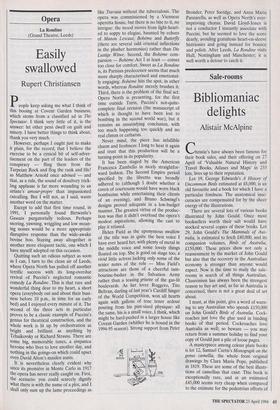Opera
La Rondine (Grand Theatre, Leeds)
Easily swallowed
Rupert Christiansen
People keep asking me what I think of this booing at Covent Garden business, which stems from a classified ad in The Spectator. I think very little of it, is the answer: let other pens dwell on guilt and misery. I have better things to think about, thank you very much.
However, perhaps I ought just to make it plain, for the record, that I believe the exercise to be a cynical bit of self-adver- tisement on the part of the leaders of the conspiracy — fling them from the Tarpeian Rock and flog the rank and file! as Matthew Arnold once advised — and that, as a rule, the sound of desultory trick- ling applause is far more wounding to an artiste's amour-propre than impassioned catcalling. But I will not, as I said, waste another word on the matter.
Except to add that first time round, in 1991, I personally found Birtwistle's Gawain purgatorially tedious. Perhaps snoring, yawning, wriggling and low moan- ing noises would be a more appropriate disruptive response than the wide-awake bovine boo. Staying away altogether is another more eloquent tactic, one which I have myself adopted on this occasion.
Quitting such an odious subject as soon as I can, I turn to the clean air of Leeds, where Opera North has pulled off another terrific success with its long-overdue revival of Puccini's neglected romantic comedy La Rondine. This is that rare and wonderful thing dear to my heart, a short opera (everybody out and about their busi- ness before 10 p.m., in time for an early bed) and I enjoyed every minute of it. The second of the three acts in particular proves to be a classic example of Puccini's genius for theatrical construction, and the whole work is lit up by orchestration as bright and brilliant as anything by Tchaikovsky or Richard Strauss. There are some big, memorable tunes, a simpatica heroine who lives to love another day, and nothing in the goings-on which could upset even David Alton's maiden aunts.
It is nevertheless clearly evident why since its premiere in Monte Carlo in 1917 the opera has never really caught on. First, the scenario: you could scarcely dignify what there is with the name of a plot, and I shall only sum up the lame proceedings as like Traviata without the tuberculosis. The opera was commissioned by a Viennese operetta house, but there is no bite to it, no intrigue: the mood moves from light-heart- ed to soppy to elegiac, haunted by echoes of Manon Lescaut, Boheme and Butterfly (there are several odd oriental inflections in the plusher harmonies) rather than Die Lustige Witwe. Second, the Boheme com- parsion — Boheme Act I at least — comes too close for comfort. Sweet as La Rondine is, its Parisian predecessor seems that much more sharply characterised and emotional- ly engaging: Boheme hits the spot, in other words, whereas Rondine merely brushes it. Third, there is the problem of the final act. Opera North is presenting, for the first time outside Turin, Puccini's not-quite- complete final revision (the manuscript of which is thought to have been lost to bombing in the second world war), but it remains an unsatisfying conclusion, with too much happening too quickly and no real climax or catharsis.
Never mind, the piece has infallible charm and freshness: I long to hear it again and trust that this production will be a turning-point in its popularity. It has been staged by the American Francesca Zambello in nicely straightfor- ward fashion. The Second Empire period specified by the libretto was broadly adhered to (although I doubt whether a coven of courtesans would have worn black bombazine while entertaining their clients of an evening), and Bruno Schwingl's designs proved adequate in a low-budget manner. The greatest virtue of the produc- tion was that it didn't overload the opera's modest aspirations, allowing the cast to play it relaxed.
Helen Field as the eponymous swallow of the title was in quite the best voice I have ever heard her, with plenty of metal in the middle voice and some lovely things floated on top. She is good on stage too, a vivid little actress lacking only some of the sexier notes of the role — Miss Field's attractions are those of a cheerful tam- bourine-basher in the Salvation Army rather than a teasing grisette of the gas-lit boulevards. As her lover Ruggero, Tito Beltran, darling of last year's Cardiff Singer of the World Competition, won all hearts again with gallons of true tenor ardour pouring from his pint-sized physique: all the same, his is a small voice, I think, which might be hard-pushed in a larger house like Covent Garden (whither he is bound in the 1994-95 season). Strong support from Peter Bronder, Peter Savidge, and Anna Maria Panzarella, as well as Opera North's ever- improving chorus. David Lloyd-Jones is not a conductor I instantly associate with Puccini, but he seemed to love the score dearly, avoiding gratuitous heart-on-sleeve histrionics and going instead for bounce and polish. After Leeds, La Rondine visits Hull, Nottingham and Manchester; it is well worth a detour to catch it.


























































 Previous page
Previous page